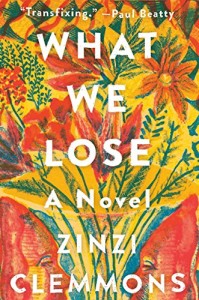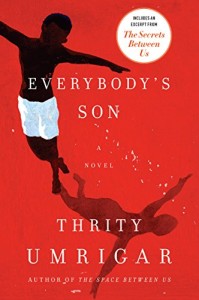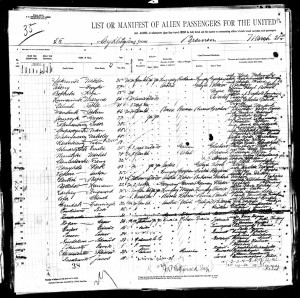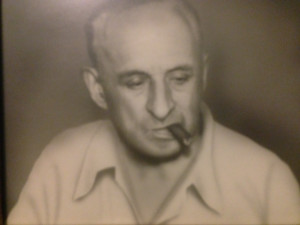Resistance takes many forms. Remember the whole “people from s**thole countries” moment in this low level of civil discourse we’ve been chafing against in this new American era? This edition of Some Good Books focuses on authors or descendants of people from some of those places. There’s been a lot said in the last year against immigrants. But the truth is, most of us are descendants of immigrants, if not immigrants ourselves. Isn’t that the whole point of the United States? The fact is that immigration is what makes this country unique, and what continues to enrich and enliven American culture. This would be a good time to take a chance on an author with whom you might not be familiar. Some of the following authors are American born descendants of immigrants (ok, right, aren’t we all?), and some are immigrants themselves. Here are some suggestions.
Goodbye, Vitamin by Rachel Khong ©©©
 Hong’s quietly beautiful first novel centers around a young woman, Ruth, who has come back to her parents’s house. Newly out of a relationship and unsure what to do with her life, she comes home to help her mother care for her father, a college professor with dementia. There is tenderness here, shot through with both sweetness and pain. Ruth cares for her father with compassion and humor, first trying valiantly to protect him from his new self, and then trying to figure out how they, and Ruth’s mother, can live with the truth of what is happening to this once sharp and admired man. Her mother moves in and out of the frame as she too tries to navigate what is happening to their family, but the heart of this novel is the relationship between Ruth and her father. There is no fairy tale ending, but Hong manages to gently push Ruth into a place where she can take charge of her life again.
Hong’s quietly beautiful first novel centers around a young woman, Ruth, who has come back to her parents’s house. Newly out of a relationship and unsure what to do with her life, she comes home to help her mother care for her father, a college professor with dementia. There is tenderness here, shot through with both sweetness and pain. Ruth cares for her father with compassion and humor, first trying valiantly to protect him from his new self, and then trying to figure out how they, and Ruth’s mother, can live with the truth of what is happening to this once sharp and admired man. Her mother moves in and out of the frame as she too tries to navigate what is happening to their family, but the heart of this novel is the relationship between Ruth and her father. There is no fairy tale ending, but Hong manages to gently push Ruth into a place where she can take charge of her life again.
 Chemistry, by Weike Wang ©©
Chemistry, by Weike Wang ©©
This quirky first novel by Wang draws on the author’s background in science to tell the story of a PhD student who finds herself unable to keep going forward. She has so far done all that her immigrant Chinese parents expected, and is on the way to becoming exactly the daughter they planned for. But her research in chemistry is leading nowhere, and when her scientist boyfriend proposes marriage, she realizes that she can’t keep living up to other people’s expectations. She steps out of her prescribed life, and into a world of questions as she begins to think about what it is she really wants, and who she wants to be. The writing feels both surgically precise and expertly indecisive, looping in and out of focus, beautifully capturing the tension within which the unnamed narrator is stuck as she tries to figure out how to become her own person. Though the style and voice are unique, there is much familiar ground here for anyone who has grappled with meeting the expectations of immigrant parents, or really, any parents.
What We Lose, by Zinzi Clemmons ©©©
 This achingly gorgeous novel about losing one’s mother is Clemmons’s first. This novel is narrated by Thandi, the American-born daughter of a white American father and a black South African mother. She has spent her life feeling not quite this or that, not white but not black, not American but not foreign. With her mother’s illness and then death, the questions about her identity move into starker relief. This tale is a study in pain and grief, in which the writing itself stops and starts in bursts, sometimes just a single line, sometimes an outpouring of love and loss, punctuated with occasional graphs and images. We follow Thandi through the pain of her mother’s death and slowly into a new life of in which she will learn to love, trust herself, and become a mother as she begins to connect the dots of her complex identity.
This achingly gorgeous novel about losing one’s mother is Clemmons’s first. This novel is narrated by Thandi, the American-born daughter of a white American father and a black South African mother. She has spent her life feeling not quite this or that, not white but not black, not American but not foreign. With her mother’s illness and then death, the questions about her identity move into starker relief. This tale is a study in pain and grief, in which the writing itself stops and starts in bursts, sometimes just a single line, sometimes an outpouring of love and loss, punctuated with occasional graphs and images. We follow Thandi through the pain of her mother’s death and slowly into a new life of in which she will learn to love, trust herself, and become a mother as she begins to connect the dots of her complex identity.
Home Fires, by Kamila Shamsie ©©
 Kamila Shamsie, from Karachi and now living in London, is not technically an immigrant to the United States. But she is an immigrant all the same, and since she went to both college (Hamilton College) and graduate school (UMass Amherst) in the US, I’m taking the liberty of including her in this round-up. Home Fires, long listed for the Baileys Women’s Prize for Fiction (formerly the Orange Prize), reads like a movie. It is fast-paced, full of filmic imagery, and centers around many of the complicated issues of our day. Having raised her younger twin siblings after the separate deaths of their parents, Isma is finally able to get on with her own life. Though scared about coming to America as a muslim woman whose father was a jihadist, she accepts an invitation to leave London and study in the United States. She reluctantly leaves her sister Aneeka alone in London while Aneeka’s twin brother Parvaiz secretly follows their father’s footsteps on an uncertain and dangerous path. At a cafe in Northampton, Isma meets Eamon, also a son of Pakistani immigrants to Britain, and the futures of all the siblings quickly get wrapped up together with Eamon and his family. Privilege, class, or the right papers cannot protect any of these children of immigrants from the inevitable disaster which early on is clearly bound to happen by the end of the book. This is very much a novel of the early 21st century, a story of mistrust of muslim immigrants, a clash of east versus west, and the ways in which surveillance and security not only provide safety but also feed into our worst fears and cause terrible, and irreversible, harm .
Kamila Shamsie, from Karachi and now living in London, is not technically an immigrant to the United States. But she is an immigrant all the same, and since she went to both college (Hamilton College) and graduate school (UMass Amherst) in the US, I’m taking the liberty of including her in this round-up. Home Fires, long listed for the Baileys Women’s Prize for Fiction (formerly the Orange Prize), reads like a movie. It is fast-paced, full of filmic imagery, and centers around many of the complicated issues of our day. Having raised her younger twin siblings after the separate deaths of their parents, Isma is finally able to get on with her own life. Though scared about coming to America as a muslim woman whose father was a jihadist, she accepts an invitation to leave London and study in the United States. She reluctantly leaves her sister Aneeka alone in London while Aneeka’s twin brother Parvaiz secretly follows their father’s footsteps on an uncertain and dangerous path. At a cafe in Northampton, Isma meets Eamon, also a son of Pakistani immigrants to Britain, and the futures of all the siblings quickly get wrapped up together with Eamon and his family. Privilege, class, or the right papers cannot protect any of these children of immigrants from the inevitable disaster which early on is clearly bound to happen by the end of the book. This is very much a novel of the early 21st century, a story of mistrust of muslim immigrants, a clash of east versus west, and the ways in which surveillance and security not only provide safety but also feed into our worst fears and cause terrible, and irreversible, harm .
Everybody’s Son, by Thrity Umrigar ©
 Anton is the adopted son of a white family, a black boy and then a man growing up with all the trappings of white privilege. But what he believes to be the truth about his origins, and the mother who didn’t want him and couldn’t care for him, isn’t the whole story. His past and his future begin to unravel as he uncovers pieces of the story that have been hidden away, and has to rethink the foundations of his carefully constructed identity. This isn’t the strongest of Umrigar’s novels, but it is a challenging and timely story about class, privilege, the bonds of family, and about the crimes committed in the name of love.
Anton is the adopted son of a white family, a black boy and then a man growing up with all the trappings of white privilege. But what he believes to be the truth about his origins, and the mother who didn’t want him and couldn’t care for him, isn’t the whole story. His past and his future begin to unravel as he uncovers pieces of the story that have been hidden away, and has to rethink the foundations of his carefully constructed identity. This isn’t the strongest of Umrigar’s novels, but it is a challenging and timely story about class, privilege, the bonds of family, and about the crimes committed in the name of love.
And here are reviews of two additional and exceptionally good books that fit into this category, from older blogs.
Stay With Me, by Ayobami Adebay0
Rating System
©©© – Amazing Book, dazzling, blew me away
©© – Great Book, deeply satisfying
© – Good Book, but I wanted it to be even better


